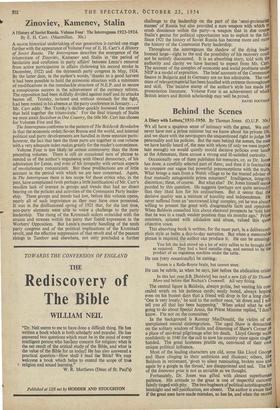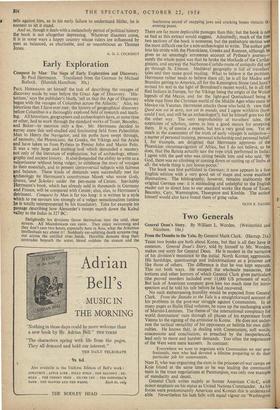Behind the Scenes
A Diary with Letters,"1931-1950. By Thomas Jones. (O.U.P. 30s.) WE all have a spurious sense of intimacy with the great. We may never have met a prime minister but we know about his private life, and we share with the newspapers the unquestioned right to judge his personality and his policies. But the men behind the scenes, the men we have hardly heard of, the men with whom (if only we were impor- tant enough) we would quietly mould decisive policies over lunch at the Athenmum, these arouse a strong and ill-satisfied curiosity. Occasionally one of them publishes his memoirs, or, as Dr. Jones has done, a carefully selected part of them; and then it is fascinating to compare our vague but powerful preconceptions with the truth[ What brings a man from a Welsh village to be the trusted adviser of four mutually antagonistic prime ministers? Intelligence, integrity, discretion; these, of course. But what else? Dr. Jones himself seems puzzled by this question. He suggests (perhaps not quite seriously) that they liked him for his ordinariness. But it seems that the decisive quality was a mixture of humility and independence. HI never suffered from an 'uncrowned king' complex, yet he was always willing to present the great with disagreeable facts and opinions, When Baldwin consulted him about electoral prospects he 'told hint that he was in a much weaker position than six months ago.' Prim., ministers, satiated with adulation and abuse, valued this viol objective voice.
This absorbing book is written, for the most part, in a deliberately plain style as befits a day-to-day narrative. But when a memorable phrase is required the author can produce it. He can be amusing: You felt she had stored up a lot of witty sallies to be brought out as required. They had a hard metallic ring, and seemed to be the product of an ingenious machine under the table.
He can (very occasionally) be cutting: Simon is a Rolls-Royce brain, but cannot steer.
He can be subtle, as when he says, just before the abdication crisis; In this last year S.B. [Baldwin] has read a new Life of Sir Thomai More and before that Buchan's Cromwell. All very fitting.
The central figure is Baldwin, always polite, but venting his con' cealed wrath on his patience cards; easily bored, always hoping even on his busiest days that a friend will drop in for a long chat. 'One is very lonely,' he said to the author once, 'sit down and I will tell you all that has been happening.' When asked what he was going to do about Special Areas, the Prime Minister replied, 'I doe' know. I'm not on the committee.'
In the background is Ramsay MacDonald, the victim of ad unexplained mental disintegration. The aged Shaw is descanting on the solitary wisdom of Stalin and dreaming of Shaw's Corner as a place of universal pilgrimage after his death. Lloyd George wait" confidently in 1940 for the call to save his country once again single' handed. The great hostesses prattle on, convinced of their oWd unique political influence.
Most of the leading characters are old, some like Lloyd Georg. and Shaw clinging to their ambitions and illusions; others, like Baldwin in retirement, 'given to silent ruminating, broken now and again by a gurgle in the throat,' are disappointed and sad. The lot of the eminence grise is not as enviable as we thought.
Fortunately, Dr. Jones was gifted with almost superhumild patience. His attitude to the great is one of respectful curiosity faintly tinged with pity. The two bugbears of political autobiography, hindsight and self-justification, are absent. The author is aware that if the great men have made mistakes, so has he, and when the record
tells against, him, as in his early failure to understand Hitler, he is content to let it staid.
And so, though it deals with a melancholy period of political history the book is not altogether depressing. Whatever disasters come, it is in some ways a happy country whose rulers are influenced by men as balanced, as charitable, and as unambitious as Thomas tones.
A. 0. 3. COCKSHUT



































 Previous page
Previous page